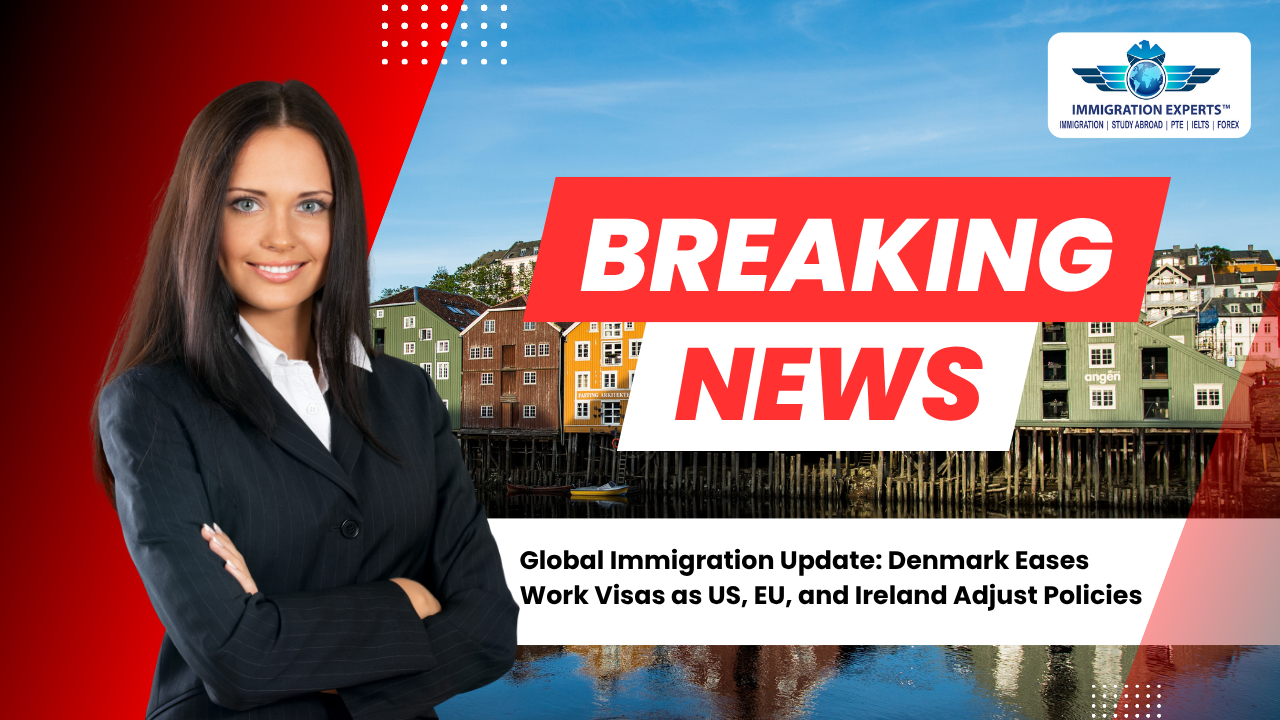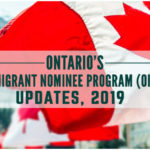
Global Immigration Update: Denmark Eases Work Visas as US, EU, and Ireland Adjust Policies
The international immigration environment is undergoing major transformation, with Denmark introducing a ground-breaking overhaul of its work visa policy.
Simultaneously, the European Union, Ireland, and the United States are implementing notable regulatory shifts affecting travellers, foreign professionals, and employers.
These changes are poised to reshape the dynamics of global mobility — bringing fresh prospects as well as new compliance challenges.
Denmark’s Major Work Visa Reform Covers 16 Non-EU Nations
To tackle labor shortages, Denmark has proposed a significant revision of its work visa framework, aiming to reduce the minimum salary requirement by over 40% for eligible professionals from 16 non-EU countries. The revised minimum annual salary will be DKK 300,000 (approximately €40,300), down from the current DKK 514,000 (€69,000), under a new “collective agreement-based business scheme.” The following countries will benefit: Australia, Brazil, Canada, China, India, Japan, Malaysia, Moldova, Montenegro, North Macedonia, Serbia, Singapore, Ukraine, UK, USA, and Albania.Employer eligibility criteria include:
- A workforce of at least 10 full-time employees
- Compliance with Danish collective bargaining agreements
- Government certification with strict labor regulation adherence
- Attendance at official integration and orientation sessions
Employee conditions involve:
- Earning at least DKK 300,000 annually
- Holding full-time positions
- Being paid through Danish bank accounts
- Passing criminal background checks
The Danish Agency for International Recruitment and Integration (SIRI) will administer the scheme, issuing certifications valid for three years, extendable up to four. The government has yet to announce an exact start date.
Need assistance with immigration or visas? Contact us today for expert guidance and support!
ETIAS Fee Increased Ahead of 2026 EU Travel Authorization Rollout
The European Commission confirmed in July 2025 that the ETIAS (European Travel Information and Authorisation System) fee will increase from €7 to €20 for travelers from visa-exempt countries. This adjustment is meant to account for rising operational costs and inflation, and mirrors similar programs such as the U.S. ESTA. Set to roll out in late 2026, ETIAS will require eligible non-EU travellers to complete an online application before entering Schengen Area countries. Most applications will be processed automatically within minutes. Exemptions remain in place for minors and senior travellers (under 18 and over 70). The proposed fee hike is under review by the European Parliament and Council as part of a two-month consultation process.Ireland Re-evaluates In-Demand Skills as Labor Needs Shift
On July 23, 2025, Ireland launched a public review of its Critical Skills and Ineligible Occupations Lists, which help determine eligibility for employment permits. Stakeholders are invited to submit recommendations or feedback via the Department of Enterprise, Trade and Employment's online platform until September 19. A role qualifies for the Critical Skills List if:- There's a verified shortage that persists despite domestic training efforts
- Hiring from abroad doesn’t negatively impact local or EEA job seekers
- The issue reflects true skills deficits rather than recruitment inefficiencies
U.S. H-1B Cap Reached for FY2026 Amid Ongoing Talent Demand
The U.S. Citizenship and Immigration Services (USCIS) has announced it has reached the cap for H-1B visa applications for fiscal year 2026 — 65,000 under the general cap and 20,000 under the advanced degree exemption (master’s cap). USCIS will continue processing:- H-1B extensions
- Changes in employer sponsorship
- Concurrent employment petitions
- Amendments for existing H-1B holders
Global Shifts Reflect Strategic Balancing of Workforce and Policy Needs
These overlapping policy adjustments reflect how governments are simultaneously responding to economic demands, border security, and international talent competition. Denmark’s visa relaxation efforts stand in contrast to more cautious approaches seen elsewhere, creating a complex and evolving immigration environment. Both employers and potential migrants must stay informed to navigate these changes effectively.Quick FAQs:
- What is Denmark’s updated minimum salary for work visa applicants? The proposed threshold is DKK 300,000 per year (~€40,300), specifically for workers from 16 designated non-EU countries under certified Danish employers.
- When will the increased ETIAS fee be enforced? The €20 fee will come into effect with ETIAS’s launch in Q4 2026. The increase is currently under legislative review by EU institutions.
- Can H-1B petitions still be filed post cap? Yes, USCIS continues to accept cap-exempt petitions, including renewals, job transfers, and concurrent roles. Only new cap-subject filings are closed for FY2026.
- How does Ireland’s skills list review work? Public submissions are open until September 19, 2025. Authorities assess whether a proposed occupation shows genuine skills shortages justifying inclusion on or removal from the respective lists.
- Which countries qualify under Denmark’s new visa scheme? The 16 eligible countries are: Albania, Australia, Brazil, Canada, China, India, Japan, Malaysia, Moldova, Montenegro, North Macedonia, Serbia, Singapore, Ukraine, UK, and USA.





